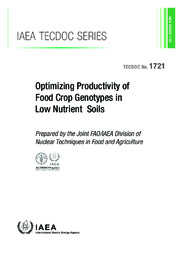Biological nitrogen fixation efficiency in brazilian common bean genotypes as measured by 15N methodology.
Biological nitrogen fixation efficiency in brazilian common bean genotypes as measured by 15N methodology.
Author(s): FRANZINI, V. I.; MENDES, F. L.; MURAOKA, T.; TREVISAM, A. R.; ADU-GYAMFI, J. J.
Summary: Common bean (Phaseolus vulgaris L.) represents the main source of protein for the Brazilian and other Latin-American populations. Unlike soybean, which is very efficient in fixing atmospheric N2 symbiotically, common bean does not dispense with the need for N fertilizer application, as the biologically fixed N (BNF) seems incapable to supplement the total N required by the crop. A experiment under controlled conditions was conducted in Piracicaba, Brazil, to assess N2 fixation of 25 genotypes of common bean (Phaseolus vulgaris L.). BNF was measured by 15N isotope dilution using a non-N2 fixing bean genotype as a reference crop. The common bean genotypes were grown in low (2.2 mg N kg-1 soil) or high N content soil (200 mg N kg-1 soil), through N fertilizer application, as urea-15N (31.20 and 1.4 atom % 15N, respectively). The bean seeds were inoculated with Rhizobium tropici CIAT 899 strain and the plants were harvested at grain maturity stage. The contribution of BNF was on average 75% of total plant N content, and there were differences in N fixing capacity among the bean genotypes. The most efficient genotypes were Horizonte, Roxo 90, Grafite, Aporé and Vereda, when grown in high N soil. None of the genotypes grown in low N soil was efficient in producing grains compared to those grown in high N soil, and therefore the BNF was not able to supply the total N demand of the bean crop.
Publication year: 2013
Types of publication: Book sections
Unit: Embrapa Eastern Amazon
Keywords: Feijão, Genótipo, Nitrogênio
Observation
Some of Embrapa's publications are published as ePub files. To read them, use or download one of the following free software options to your computer or mobile device. Android: Google Play Books; IOS: iBooks; Windows and Linux: Calibre.
Access other publications
Access the Agricultural Research Database (BDPA) to consult Embrapa's full library collection and records.
Visit Embrapa Bookstore to purchase books and other publications sold by Embrapa.

